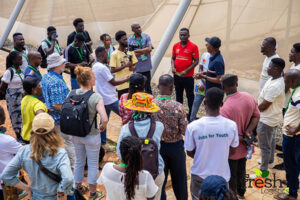From 2-6 June, researchers, policymakers and practitioners gathered in Accra, Ghana, for the Status Seminar 2025, a vibrant platform for exchanging ideas, showcasing research, and fostering collaboration on sustainable land management in sub-Saharan Africa.

The event brought together five BMFTR-funded international research consortia working under the common theme of “Sustainable Land Management in Sub-Saharan Africa.” The seminar was hosted by the INTERFACES project and jointly organised by the German Institute of Development and Sustainability (IDOS), the Forum for Agricultural Research in Africa (FARA), and the Center for Development Research (ZEF), University of Bonn.
The conference was officially opened by Ghana’s Minister for Environment, Science and Technology, Hon. Ibrahim Murtala Mohammed, who urged scientists to develop adapted technologies to support farmers in adopting smart and sustainable agricultural practices. Other distinguished guests included a senior advisor to the vice president of Ghana, the director of Ghana’s Council for Scientific and Industrial Research (CSIR), a local Chief representing the traditional authority, and a development advisor from the German Embassy in Ghana.
IDOS researcher Dr Theodore Asimeng presented key findings from field research in northern Ghana and Benin using the “Follow the Innovation” approach. He also shared results from a bibliometric study on gender and agricultural innovation. In addition, IDOS Communications Officer Sabrina Heuwinkel and FARA’s Knowledge and Project Management Officer Benjamin Abugri led a practical workshop on visual communication across cultures, equipping participants with tools for more effective cross-cultural engagement.
A highlight of the seminar was a field visit to Dawhenya, just outside Accra, where participants explored greenhouse-based vegetable farming systems, particularly models supporting youth-led agribusinesses. This offered a hands-on look at local innovations in sustainable agriculture.
The INTERFACES project works across sub-Saharan Africa, with a focus on West Africa, to enhance integration, coherence, and impact among regional research initiatives. It aims to:
- Facilitate knowledge synthesis through dialogue on future visions and theories of change
- Promote collaboration between science, policy, and practice
- Bridge knowledge-behaviour gaps through innovation and improved communication
- Strengthen networking and knowledge management, ensuring that research translates into real-world solutions

Schreibe einen Kommentar